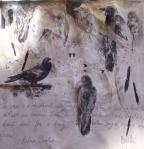The poet Lawrence Ferlinghetti, (books by this author) born in Yonkers, New York (1919). His father died five months before Ferlinghetti was born, and his mother was so devastated by the loss that she had to be committed to the state mental hospital. Young Lawrence was sent to live with his aunt in France.
He didn't learn English until he was five when he returned to America. After serving in World War II he moved to San Francisco where he decided to open a bookstore, which he named City Lights after the Charlie Chaplin movie, because he said, "Chaplin's character represents for me ... the very definition of a poet. ... A poet, by definition, has to be an enemy of the State. If you look at Chaplin films, he's always being pursued by the police. That's why he's still such a potent symbol in the cinema—the little man against the world."
He had an idea that a bookstore should be a place where artists and intellectuals could gather and exchange ideas, and so he made sure that people were allowed to sit down and read books without being pestered to buy anything. And his bookstore became a gathering place for a group of writers who became known as the Beats.
Ferlinghetti also started a publishing venture with what he called the Pocket Poets series—collections of poetry designed to be small enough to slip into your pocket. He had published three of them when, on October 13, 1955, Ferlinghetti went to a poetry reading called "Six Poets at the Six Gallery" organized by the poet Kenneth Rexroth. Kenneth Rexroth and Gary Snyder were among the readers that night, but the man who made the biggest impression was a poet named Allen Ginsberg who read a new poem called "Howl." After the reading, Ferlinghetti sent Ginsberg a telegram that said, "I greet you at the beginning of a great career. When do I get the manuscript?"
Howl and Other Poems became the fourth edition of Ferlinghetti's Pocket Poets series in September 1956. The following year, a shipment of copies of the book was seized by customs officials and Ferlinghetti was charged with printing and selling lewd and indecent material. Ferlinghetti won the case, with help from the ACLU, and all the publicity made "Howl" into a best-seller. Ferlinghetti said, "The San Francisco [customs office] deserves a word of thanks. It would have taken years for critics to accomplish what the good [customs office] did in a day."
In 1958 he also published his own collection of poetry, A Coney Island of the Mind, which shocked everyone by going through twenty-eight printings and selling 700,000 copies in the United States alone. By the end of the 1960's it was the bestselling book ever published by a living American poet.
Saturday, July 21, 2007
Subscribe to:
Post Comments (Atom)

No comments:
Post a Comment